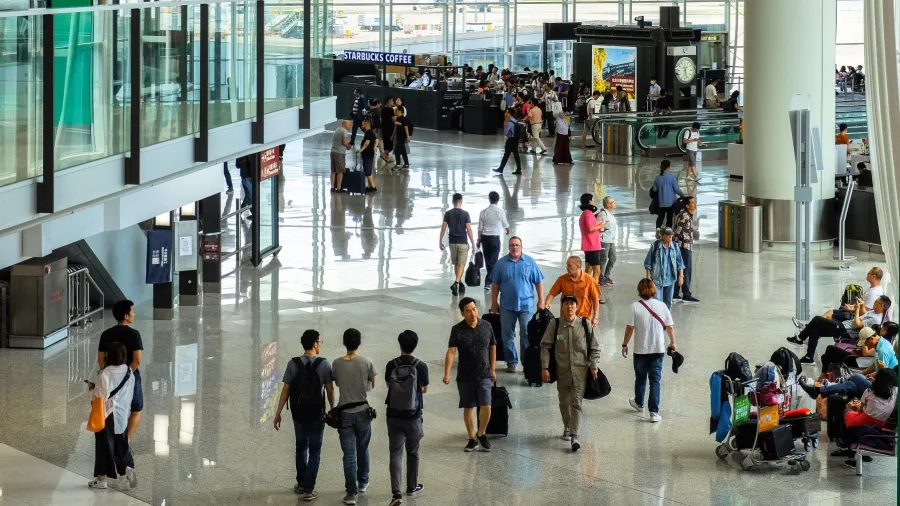
Insurance rides high on surge in Hong Kong travellers
CEO Jim Qin of Zurich Insurance cites a trend for extended vacations among Hongkongers in 2023, boosting travel insurance sales.
The pent-up travel demand resulting from years of pandemic restrictions snowballed into 1.32 million Hong Kong locals travelling during the holiday season last December, sparking higher demand for travel insurance.
“Additionally, throughout the year 2023, there was a noticeable trend of longer trip durations among Hongkongers. This suggested that people were willing to take extended vacations, possibly due to the desire for a more immersive travel experience after being deprived of travel opportunities for an extended period,” Jim Qin, chief executive officer of General Insurance at Zurich Insurance (Hong Kong), told Insurance Asia.
On 23 December alone, 506,953 residents flew out of Hong Kong whilst on 24-25 December, 458,652 and 362,139 departures were logged, respectively. Compared to 2022 when 27,770 locals departed Hong Kong on 23 December, the latest figure reflects a 1,727.56% leap, based on data from the Immigration Department.
An Allied Market Research report said Asia Pacific’s travel insurance market was estimated to record $9.9b in 2022. In another research conducted by Ancileo, the global market size for travel coverage could reach $50b by 2025.
This expansion is driven by increased travel and the rise of digital platforms, making the travel insurance industry highly competitive and dynamic. In turn, the travel insurance industry has seen substantial growth due to heightened consumer awareness of travel risks and a demand for quality coverage.
This demand has led to the development of personalised insurance policies tailored to individual needs. The region’s market is expected to grow by 17% in the next five years, with Japan, Bangladesh, and India as key players.
The allure of destinations like Japan continues to captivate Hongkongers, further contributing to the surge. Also, the strength of the US dollar and favourable foreign exchange effects may have boosted purchasing power, incentivising more individuals to plan and embark on international travels.
The World Travel & Tourism Council (WTTC), on the other hand, forecasts a robust recovery for the Asia Pacific travel and tourism sector by 2023, with the region’s tourism revenue projected to surpass pre-pandemic levels by 32%.
This resurgence is expected to generate 65% of the new jobs in the global travel industry over the next decade, with China and India being key contributors.
Collaboration
A recent milestone with Zurich Hong Kong is its collaboration with Hutchison Telecommunications Hong Kong (HTHK).
This partnership combines Zurich’s digital insurance skills with HTHK’s telecom expertise, targeting tech-savvy consumers. Customers can now purchase Breezy Travel Insurance and data roaming services in under five minutes via a fully digital platform, highlighting Zurich’s dedication to digital innovation and customer convenience amidst the pandemic’s challenges.
Zurich Hong Kong said it puts digitalisation forward to upgrade processes and maintain business sustainability despite external interruptions.
“During the COVID-19 pandemic, many insurance companies were unable to provide e-service options for intermediaries, leading to disruptions in business operations. In response to this challenge, Zurich took proactive steps to standardise our e-delivery sales model and enhance our suite of self-service capabilities,” said Qin.
“This allowed our business partners to easily quote new business, submit relevant documents in digital formats, and update policies without any interruption from external factors,” he added.
Outlook
The global travel insurance market, valued at $19.14b in 2022, reached $22.44b in 2023 with a compound annual growth rate (CAGR) of 17.3%, according to a report by Research and Markets titled “Travel Insurance Global Market Report 2023.”
The Russia-Ukraine war disrupted global economic recovery from the COVID-19 pandemic, leading to economic sanctions, commodity price surges, and supply chain disruptions.
Despite these challenges, the travel insurance market is expected to grow to $40.58b in 2027 at a CAGR of 16.0%.
According to a 2022 UNWTO report, global tourism increased by 4% in 2021, reaching 415 million, fostering the expansion of the travel insurance market.
It is noteworthy that Asia-Pacific dominated the travel insurance market in 2022. And whilst the rise in tourism contributes to market growth, travel insurance provides financial assistance for medical emergencies, passport loss, flight cancellations, and lost luggage, which remains top of mind for travellers.

















 Advertise
Advertise






